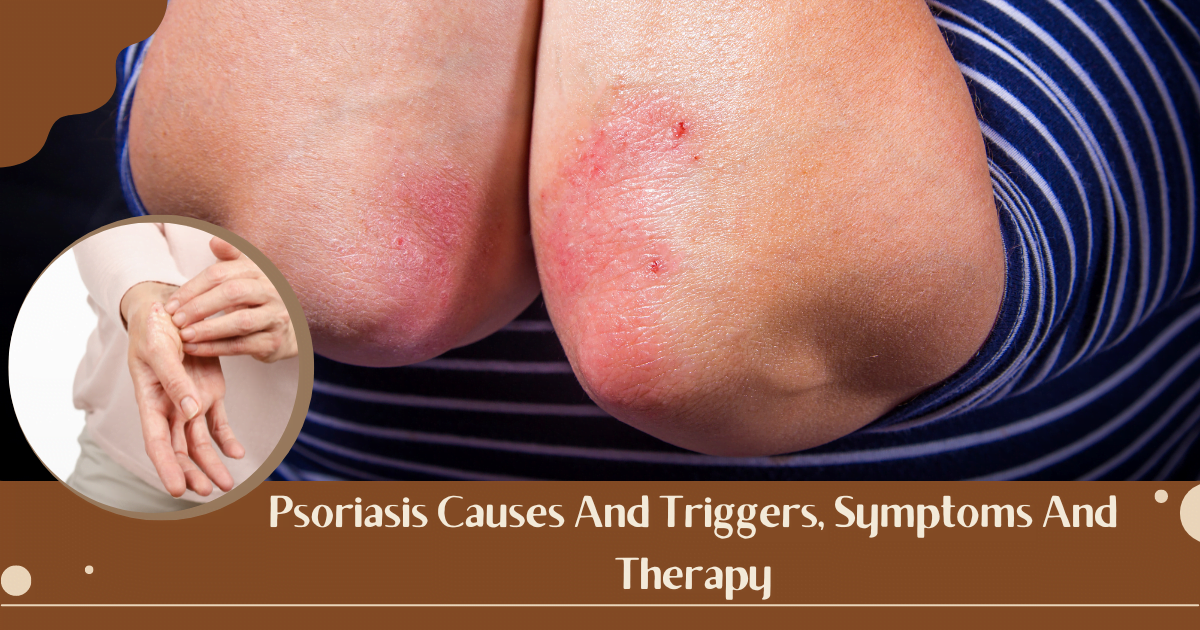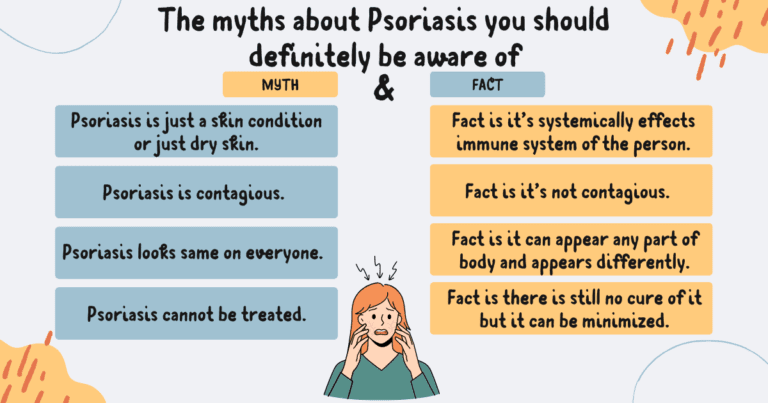Psoriasis Causes And Triggers, Symptoms, And Therapy

Table of Contents
ToggleWhat is psoriasis? How do you get Psoriasis?
Psoriasis is a disease that causes rashes on the skin and other problems. Psoriasis cause is an excessively rapid growth of skin cells and a low-grade inflammation in the body. There are different forms of psoriasis. Most do not go away but can disappear for periods with the help of various treatments. One in every three people who have psoriasis will develop psoriatic arthritis. Psoriasis is not contagious. Psoriasis often occurs in so-called flare-ups. This means periods with more discomfort and larger rashes and periods with little or no discomfort.
There are several different forms of skin changes in psoriasis. They differ in terms of what the rash looks like and on which part of the body.
What are the types of psoriasis?
- PLAQUE PSORIASIS- Plaque psoriasis manifests itself as round, red scaly rashes a few centimeters in size that can grow together into larger areas, so-called plaques. Common places are the elbows, knees, lower back and scalp. Plaque psoriasis usually occurs on both sides of the body.
- GUTTED PSORIASIS- Symptoms of guttate psoriasis are red spots as big as drops of water on the skin. Guttate psoriasis is most common during puberty. But this type of psoriasis goes away.
- INVERSE (FLEXURAL) PSORIASIS- Inverse psoriasis produces red rashes with a glossy surface in skin folds. For example, the rash usually appears in the groin, armpits, navel and under the breasts. Inverse psoriasis does not scale.
- NAIL PSORIASIS- Symptoms of nail psoriasis are round pits on the tops of the nails. Sometimes the outermost part of the nails detaches from the skin.
- PUSTULOSIS PALMOPLANTARIS (PPP)- Pustulosis palmoplantaris causes a rash on the palms of the hands and on the soles of the feet. It often starts with yellow wart blisters that then turn brownish. They dry out and a crust forms which comes off. PPP happens for people who smoke or had smoked. But it is a kind of disease in itself.
- ERYTHRODERMIC PSORIASIS- Erythrodermic psoriasis is a rare form of psoriasis that affects nearly all the skin on the body. This can cause intense itching or burning. Erythrodermic psoriasis can come on suddenly and may need emergency medical treatment. It can cause your body to lose proteins and fluid, leading to further problems such as infection, dehydration, heart failure, hypothermia and malnutrition.

Here we explain what treatment may help:
Along with discussing Psoriasis treatment options with your doctor or dermatologist, there are home remedies that you may find work well for you.
- SALT BATH: Bathing with Dead Sea salts in particular has shown a beneficial effect for treating psoriasis. The Dead Sea contains a wealth of minerals and is much saltier than the ocean.
- ALOE VERA: Creams made from extracts of the aloe vera plant can be applied to the skin to help reduce redness, scaling, itching, and inflammation. The results of clinical studies testing whether aloe vera creams help with psoriasis have shown mixed results.
- OMEGA 3 FATTY ACIDS: Consume foods rich in omega 3 fatty acid such as flaxseed oil, nuts, seeds, soy and fatty fish.
- TURMERIC: Applying turmeric gel can be encouraged but we must test what is good for one’s skin. Skin types varies so it may sometime suit to some and not other.
- STRESS RELIEVING ACTIVITIES: Yoga, meditation, deep breathing exercises can help in good breathing in turn rejuvenates skin.
- OREGON GRAPE: This is a antimicrobial herb can be used in ointments
- SUNLIGHT: Exposure to sunlight can sometimes improve the appearance of the skin when a person has psoriasis. People should expose their skin gradually and for brief periods.
What to avoid when a person is infected by psoriasis ????
These 6 things can also possibly worsen your psoriasis, so be sure to speak with your doctor about alternatives and living a healthier life with psoriasis.
- ALCOHOL: Some people indulged in alcohol, experience skin itches tremendously. Alcohol leaves your body dehydrated, causing your kidneys to work overtime. It can also decrease the effectiveness of psoriasis meds. After talking with your doctor if you do have a cocktail, make sure water outweighs alcohol consumption.
- SMOKING: There have only been a few studies on cigarettes’ effect on psoriasis. While researchers can’t pinpoint exactly how it worsens psoriasis, the condition has been shown to worsen in those who smoke compared to those who don’t smoke. Smoking is bad for your health overall.
- HOT BATH: If you love hot showers, be careful , the hotter the water the more it dries out my skin. Hot water can be harsh on skin especially in the winter time when we’re already combating cold weather. Hot showers strip away natural oils the body produces - and with psoriasis, we need all the oil we can possibly receive. A nurse once suggested I take 5-10 minute lukewarm showers instead.
- STRESS: Psoriasis and stress go hand in hand. In psoriasis it’s important to keep stress at bay to avoid severity.
- COLD WEATHER: In cold regions where the temperature falls in minus and below 4 degrees experience flakes on skin as the coldness dries out skin. Always wear nice jackets to avoid itchiness and redness.
- HEAT: Using electric heaters can dry out skin so while using heaters also use humidifiers.
Key findings of the Skin Insights: Uncovering Psoriasis Survey
- 90% wish there were more effective topical treatment options
- 90% wish they could use a single topical therapy anywhere on their body
- 81% wish they had more topical treatment alternatives to steroids
- 68% want a product that provides both improvement in plaques and itch relief (68%).
Psoriasis is a skin disease. Never overlook the symptoms and try to reach out to the doctor immediately. Along with that you can follow the herbal ways to protect yourself from getting infected more. All should be carried out after consulting the doctor
About Alia Khalifa
"My journey to Health & Wellness influencer status stems from a personal transformation. Fascinated by the body's healing power, I advocate a holistic health approach—embracing fitness, mental well-being, and nutritional balance." View all posts by Alia Khalifa
